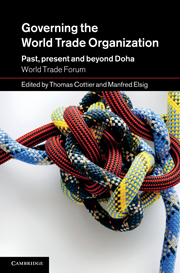Book contents
- Frontmatter
- Contents
- List of figures
- List of tables
- Notes on Contributors
- Preface
- List of abbreviations
- 1 Introduction
- PART I Setting the stage
- PART II Boundaries
- PART III Emerging and established powers
- 6 Adapting to new power balances: institutional reform in the WTO
- 7 Delegation chains, agenda control and political mobilisation: how the EU Commission tries to affect domestic mobilisation on the DDA
- PART IV Weaker actors
- PART V The consensus principle
- PART VI Quo vadis?
- Index
- References
7 - Delegation chains, agenda control and political mobilisation: how the EU Commission tries to affect domestic mobilisation on the DDA
Published online by Cambridge University Press: 07 September 2011
- Frontmatter
- Contents
- List of figures
- List of tables
- Notes on Contributors
- Preface
- List of abbreviations
- 1 Introduction
- PART I Setting the stage
- PART II Boundaries
- PART III Emerging and established powers
- 6 Adapting to new power balances: institutional reform in the WTO
- 7 Delegation chains, agenda control and political mobilisation: how the EU Commission tries to affect domestic mobilisation on the DDA
- PART IV Weaker actors
- PART V The consensus principle
- PART VI Quo vadis?
- Index
- References
Summary
Introduction
The Doha Development Agenda (DDA) is in jeopardy, or at least seems so for the time being. Negotiations have been dragging on now for more than seven years, and the end of them is not in sight. Efforts to get these talks back on track, not the least those of WTO Director-General Pascal Lamy, have not succeeded in enabling real breakthroughs. Attempts to give the talks a political momentum have largely failed as well. Whether it was the G7, the G20 Summit, or bilateral summitry, none of them really succeeded in breaking through the logic that keeps the talks in deadlock. This chapter aims to look more deeply into this deadlock, but to do so from the perspective of the European Union and its internal dynamics. The purpose of the chapter is to analyse the way the strategic negotiating set-up of an intergovernmental organisation like the WTO affects the EU's ability to participate effectively in multilateral trade negotiations. It performs this analysis by focusing on the opportunities and constraints that such a set-up creates for the institution that negotiates on behalf of the EU (its agent), and for those domestic EU players that control this agent (the principals). In doing this, we try to identify and understand the chain of delegation that matters for the EU whenever it negotiates multilaterally, and the international institutional factors that affect the processes of autonomy and control in that chain.
- Type
- Chapter
- Information
- Governing the World Trade OrganizationPast, Present and Beyond Doha, pp. 129 - 154Publisher: Cambridge University PressPrint publication year: 2011
References
- 1
- Cited by



